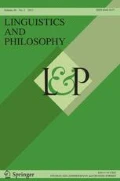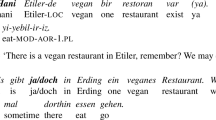Abstract
In this paper, I defend the thesis that alleffects of extra-linguistic context on the truth-conditions of an assertion are traceable to elements in the actual syntactic structure of the sentence uttered. In the first section, I develop the thesis in detail, and discuss its implications for the relation between semantics and pragmatics. The next two sections are devoted to apparent counterexamples. In the second section, I argue that there are no convincing examples of true non-sentential assertions. In the third section, I argue that there are no convincing examples of what John Perry has called ‘unarticulated constituents’. I conclude by drawing some consequences of my arguments for appeals to context-dependence in the resolution of problems in epistemology and philosophical logic.
Similar content being viewed by others
REFERENCES
Ajdukiewicz, K.: 1967, ‘Syntactic Connexion’, in Storrs McCall (ed.), Polish Logic, Clarendon Press, Oxford, pp. 207–31.
Austin, J.: 1970, How to Do Things With Words, Harvard University Press, Cambridge.
Austin, J: 1979, ‘Truth’, in J. L. Austin (ed.), Philosophical Papers, Oxford University Press, Oxford, pp. 117–133.
Bach, K.: 1982, ‘Semantic Nonspecificity and Mixed Quantifiers’, Linguistics and Philosophy 4, 593–605.
Bach, K.: 1994, ‘Conversational Impliciture’, Mind and Language 9, 124–162.
Bach, K.: 1999, ‘The Semantics Pragmatics Distinction: What it is and Why it matters’, in Ken Turner (ed.), The Semantics-Pragmatics Interface from Different Points of View, Oxford, Elsevier, pp. 65–84.
Bar-Hillel, Y.: 1954, ‘Indexical Expressions’, Mind 63, 359–79.
Barker, C.: 1995, Possessive Descriptions, CSLI Publications, Stanford.
Barton, E.: 1990, Nonsentential Constituents, John Benjamins, Amsterdam.
Van Benthem and Ter Meulen (eds.): 1997, Handbook of Logic & Language, MIT Press, Cambridge.
Blackburn, W. K.: ‘Wettstein on Definite Descriptions’, Philosophical Studies 53, 263–78.
Burge, T.: 1979, ‘Semantical Paradox’, The Journal of Philosophy 76, 169–98.
Carston, R.: 1991, ‘Implicature, Explicature, and Truth-Theoretic Semantics’, in Stephen Davis (ed.), Pragmatics, Oxford University Press, Oxford, pp. 33–51.
Cassam, Q.: 1997, Self and World, Clarendon Press, Oxford.
Chierchia, G.: 1993, ‘Questions with Quantifiers’, Natural Language Semantics 1, 181–234.
Chierchia, G.: 1995, Dynamics of Meaning, University of Chicago Press, Chicago.
Chomsky, N.: 1995, The Minimalist Program, MIT Press, Cambridge.
van Deemter, K. and Peters, S. (eds.): 1996, Semantic Ambiguity and Underspecification, CSLI, Stanford.
Cooper, R.: 1996, ‘The Role of Situations in Generalized Quantifiers’, in Lappin (1996), pp. 65–86.
Cresswell, M.: 1973, Logics and Languages, Metheun, London.
Cresswell, M.: 1996, Semantic Indexicality, Kluwer Academic Publishers, Dordrecht.
Crimmins, M.: 1992, Talk about Beliefs, MIT Press, Cambridge.
Culicover, P. and R. Jackendoff: 1995, ‘ ‘Something else’ for the Binding Theory’, Linguistic Inquiry 26, 249–275.
DeRose, K.: 1999, ‘Contextualism: An Explanation and Defense’, in John Greco and Ernest Sosa (eds.), The Blackwell Guide to Epistemology, Blackwell, Oxford, pp. 187–205.
Engdahl, E.: 1986, Constituent Questions, Reidel, Dordrecht.
Evans, G.: 1985, ‘Pronouns, Quantifiers, Relative Clauses (I)’, in Gareth Evans (ed.), Collected Papers, Clarendon Press, Oxford, pp. 76–152.
Fiengo, R. and R. May: 1996, ‘Anaphora and Identity’, in Lappin (1996), pp. 117–44.
von Fintel, K.: 1994, Restrictions on Quantifier Domains, University of Massachusetts Dissertation.
Grice, Paul: 1989, ‘Logic and Conversation’, in Studies in the Way of Words, Harvard University Press, Cambridge, pp. 22–40.
Harman, G.: 1972, ‘Deep Structure as Logical Form’, in D. Davidson and G. Harman (eds.), Semantics of Natural Language, Reidel, Dordrecht.
Heim, I. and A. Kratzer: 1998, Semantics in Generative Grammar, Blackwell, Oxford.
Higginbotham, J.: 1996, ‘Davidson's Program in Semantics’, in E. LePore (ed.), Truth and Interpretation: Perspectives on the Philosophy of Donald Davidson, Blackwell, Oxford, pp. 29–48.
Higginbotham, J.: 1993, ‘Interrogatives’, in K. Hale and S.J. Keyser (eds.), The View from Building 20: Essays in Honor of Sylvan Bromberger, MIT Press, Cambridge, pp. 195–227.
Higginbotham, J.: ms. ‘A Plea for Implicit Anaphora’.
Hintikka, J. and G. Sandu: 1997, ‘Game Theoretical Semantics’, in van Benthem and Ter Meulen (1997), pp. 361–410.
Jacobson, P.: 1999, ‘Towards a Variable-Free Semantics’, Linguistics and Philosophy 22, 117–184.
Janssen, T.: 1997, ‘Compositionality’, in Van Benthem and Ter Meulen (1997), pp. 417–473.
Koopman H. and D. Sportiche: 1982/83, ‘Variables and the bijection principle’, The Linguistic Review 2, 139–60.
Lappin, S. (ed.): 1996, The Handbook of Contemporary Semantic Theory, Blackwell Press, Oxford.
Lewis, D.: 1983, ‘General Semantics’, in David Lewis (ed.), Philosophical Papers, Volume 1, Oxford University Press, Oxford, pp. 189–232.
May, R.: 1985, Logical Form: Its Structure and Derivation, MIT Press, Cambridge.
Mitchell, J.: 1986, The Formal Semantics of Point of View, Unpublished University of Massachusetts Amherst Doctoral Dissertation.
Partee, B.: 1989, ‘Binding Implicit Variables in Quantified Contexts’, Proceedings of the Chicago Linguistics Society 25, University of Chicago Press, Chicago, pp. 342–65.
Perry, J.: 1986, ‘Thought without Representation’, in Supplementary Proceedings of the Aristotelian Society 60, 137–52.
Perry, J.: 1997, ‘Indexicals and Demonstratives’, in Hale and Wright (eds.), A Companion to the Philosophy of Language, Blackwell Press, Oxford, pp. 586–612.
Perry, J.: 1998, ‘Indexicals, Contexts and Unarticulated Constituents’, in Aliseda, van Gabeek, and Westerståhl (eds.), Computing Natural Language, CSLI Publications, Stanford, pp. 1–11.
Recanati, F.: 1993, Direct Reference, Blackwell Press, Oxford.
Rizzi, L: 1986, ‘Null Objects in Italian and the Theory of Pro’, Linguistic Inquiry 17, 501–57.
Russell, B.: 1985, The Philosophy of Logical Atomism, Open Court, LaSalle.
Salmon, N.: 1986, Frege's Puzzle, MIT Press, Cambridge.
Soames, S.: 1987, ‘Direct Reference, Propositional Attitudes, and Semantic Content’, in Philosophical Topics 14, 47–87.
Soames, S.: 1986, ‘Incomplete Definite Descriptions’, Notre Dame Journal of Formal Logic 27, 349–75.
Sperber, D. and D. Wilson: 1986, Relevance, Harvard University Press, Cambridge.
Stainton, R.: 1994, ‘Using Non-Sentences: An Application of Relevance Theory’, Pragmatics and Cognition 2, 269–284.
Stainton, R.: 1995, ‘Non-Sentential Assertions and Semantic Ellipsis’, Linguistics and Philosophy 18, 281–96.
Stainton, R.: 1997, ‘Utterance Meaning and Syntactic Ellipsis’, in Pragmatics & Cognition 5, 51–78.
Stainton, R.: 1998, ‘Quantifier Phrases, Meaningfulness ‘In Isolation’, and Ellipsis’, Linguistics and Philosophy 21, 311–340.
Stalnaker, R.: 1970, ‘Pragmatics’, Synthese 22, 272–89.
Stanley, J. and Z. Szabó: ‘On Quantifier Domain Restriction’, forthcoming in Mind and Language.
Szabolcsi, A.: 1989, ‘Bound Variables in Syntax (are there any?)’, in Bartsch, van Benthem, and van Emde Boas (eds.), Semantics and Contextual Expression, Foris, Dordrecht, pp. 295–318.
Varzi, A.: 1993, ‘Do We Need Functional Abstraction?’, in J. Czermak (ed.), Proceedings of the 15th International Wittgenstein-Symposium, H'older-Pickler-Tempsky, Vienna, pp. 407–15.
Williams, E.: 1995, Thematic Structure in Syntax, Linguistic Inquiry Monograph Twenty Three, MIT Press, Cambridge.
Yanofsky, N.: “NP Utterances”, Papers from the Fourteenth Regional Meeting of the Chicago Linguistics Society, Chicago Linguistics Society, Chicago, pp. 491–502.
Rights and permissions
About this article
Cite this article
Stanley, J. Context and Logical Form. Linguistics and Philosophy 23, 391–434 (2000). https://doi.org/10.1023/A:1005599312747
Issue Date:
DOI: https://doi.org/10.1023/A:1005599312747




